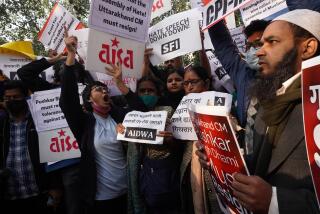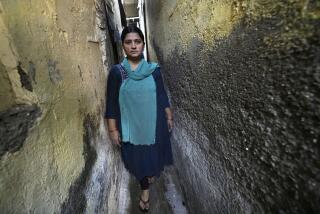India’s Voiceless Women Are Easy Prey for AIDS
The $100 million that Bill Gates’ philanthropy will add to the battle against HIV and AIDS in India is a welcome expression of concern for what Gates rightly portrays as one of the worst epidemics in the world. But the Gates Foundation’s generous support may be undone by factors that neither the government of India nor its donors are addressing: the voicelessness of women and increasing violence against those most affected by the epidemic.
The Indian government clings to the idea that the epidemic is limited to such “high-risk groups” as sex workers, drug users and men who have sex with men and that targeting these groups with information about condoms and how AIDS is transmitted is the best strategy to contain the epidemic.
Yet this no longer reflects the reality of AIDS, at least for the Indian states where it is in the general population. In these states, women who have sex only with their husbands may be the group at highest risk of HIV transmission.
The long-standing subordination of women and girls in Indian society takes on lethal dimensions with the rapid spread of HIV. Though men can experiment with sex outside of marriage without any social stigma, women do not even have the status to demand that husbands who may bring sexually transmitted diseases home use condoms.
Many Indian women are experiencing what their African sisters have known for years: that being left a widow by a man who dies from AIDS is a ticket to abandonment by his family and dire poverty and discrimination. And although they are a high-risk group for HIV transmission and the worst consequences of AIDS, most government programs ignore married women.
Even in those Indian states where the epidemic may still be contained among traditionally vulnerable groups, violence undermines HIV and AIDS programs. Prostitutes are continually subjected to violence by police officers, who take their cue from society’s condemnation of these women. All of this stands to get worse as religious fundamentalism and the moral judgments that go with it increasingly become defining features of political power in India.
The violence of AIDS-related stigma also confronts AIDS educators, homosexual men and other marginalized people.
The most effective education on HIV transmission is done by those trusted by the community at risk. This means that sex workers have the best chance of helping other sex workers protect themselves from HIV. But peer education is not getting a fair chance in India. The police apparently do not recognize the lifesaving work done by AIDS educators, and these people face consistent abuse.
Finally, the Indian government and its well-meaning donors seem to think that HIV prevention alone can succeed, ignoring the needs of millions already living with HIV and AIDS. These people continue to face abuse and discrimination in the health-care system, and unless they are rich they can hardly hope for the basics of treatment of even secondary infections, let alone medicines for HIV itself.
India is one of the biggest producers of the drugs that have transformed the lives of people with AIDS in wealthy countries, yet millions of Indians cannot get these medicines.
The Gates Foundation can do India and its own investment a favor by insisting that the money be used to help the voiceless women with HIV and AIDS.
Meena Seshu, founder and general secretary of the organization Sangram, which works with sex workers and rural women in Sangli, India, was named a Human Rights Defender by Human Rights Watch. Joanne Csete is director of the HIV/AIDS and human rights program at Human Rights Watch.
More to Read
Sign up for Essential California
The most important California stories and recommendations in your inbox every morning.
You may occasionally receive promotional content from the Los Angeles Times.










